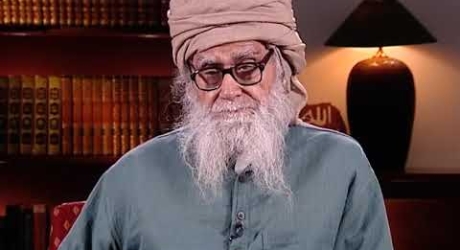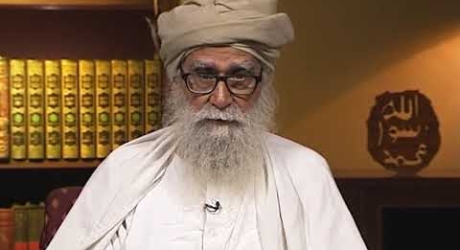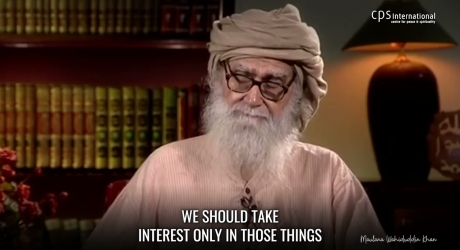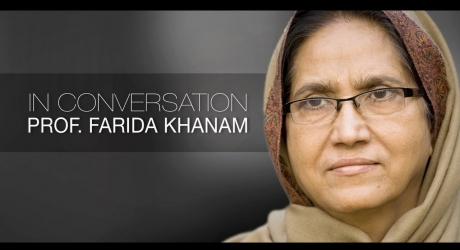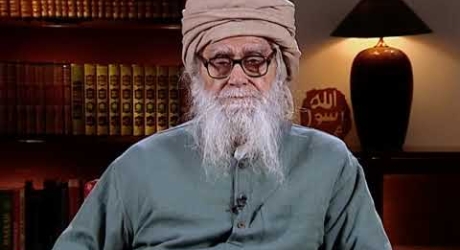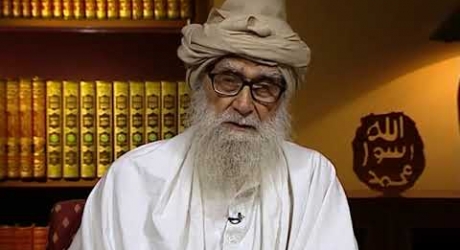What is Spirituality, or Rabbaniyat?
It is the elevation of the human condition to a plane on which the mind is focused on the higher, non-material realities of a godly existence. The opposite of spirituality is materialism, a course followed all too often in this world. One who takes this course, giving all his attention to worldly things; or one who centres his attention on mere appearances is regarded as being materialistic. Conversely, one who rises above material things or appearances, who finds his focus of interest in nonmaterial things, is regarded as being spiritual or godly. The latter is one who obeys the injunction of the Quran:
O people, be devoted servants of God. (THE QURAN, 3:79)
A materialistic person is kindled with the desire to possess anything that is attractive to him, and this is a clear indication that materialism is a major motivating factor in his life. While, one who sees the same things, but remains unaffected by the notions of luxury that they convey, and feels no desire to acquire them, lives in a more rarefied sphere in which materialism plays no part. He sees no attraction in the lesser world of material appearances, being engrossed in the higher realities of the supremely spiritual life. The truly non-material person is never influenced by superficialities: his soul exists at a profound level of spirituality.
Introduction
Every man lives by an ideology whether tacit or otherwise. Ideology is not the need of any other animal; the life of every other being revolves around safety and food. The case of man however, is quite different. Ideology provides that perspective to man, which helps him fathom the meaning of life, his goal and the future that awaits him.
History of Ideology
The ideologies that have influenced man can be divided into three main kinds namely - Secular, Religious and Rabbani.
Secular Ideology
This ideology focuses on gains of the present world. It advocates that because man has to live and die in this very world, he must strive to relish each moment. This led to emergence of ideas like – “Eat, Drink and be Merry”, “Right here, Right now”, which become the guiding principles for those who live by this ideology. They eat, drink and make merry in this world and establish themselves in comfortable homes. They believe or reject matters at will and feel free to do and say what they like.
In other words, man becomes so deluded by his worldly position that he thinks that what he owns in this world will always be his. Despite being a unique creation, he stoops to a reduced, animal-like existence and forgets that he is being put to test by means of all the power which he wields in this ephemeral world. Nothing that he has will last. Everything will be taken away from him. He will be stripped of even the most basic of the worldly amenities he used to enjoy. He will be brought before the Lord of the Universe to be judged.
Referring to death, a poet Chak bast said
Zindagi kya hai, anasir (elements) mein zahoor-e-tarteeb (order)
Maut kya hai, inhi ajzaa (parts) ka pareshan (disperse) hona
Ideology of Secularism lacks a scientific base because it utilizes the mind to a very limited extent. Such people are able to utilize their mind and strive to excel in their profession alone. The super mind that the Creator blessed them with remains grossly underutilized. Here I am reminded of an anecdote which aptly describes the situation of such people. A wealthy father gave a lot of money to his son and asked him to go and experience life in the city of Mumbai. His son could not understand how to use the money and returned without spending a dime. The father reprimanded him for lacking the ability to utilize what he possessed and cast him away from his house. His son realized his folly and went back and apologized to his father for being as imprudent. His father accepted the apology. This was however the second chance for the boy, which he availed but unfortunately once death strikes, man shall have no second chances come his way. The lives of such reckless individuals who lack sincerity and seriousness in their attitude is best described in the words of Akbar Allahabadi who famously said,
Kati umr hotelon (hotels) mein, mare aspataal (hospital) jaa kar
Religious Ideology
By “religion” here, I am referring to its prevalent, ritualistic form. It is most unfortunate that all religions of the world have been reduced to rituals in today’s times. The lives of men are no longer governed by the dictums of religion but by the dictates of rituals.
I read an article in an American magazine entitled, "Return to Religion" which describes that the huge crowds that throng churches, temples and mosques today signify the return of the new generation to religion. I however, do not agree with this explanation. To my mind, the present-day phenomenon is one of "Return to Rituals" and not of return to religion.
Here I would like to cite the observation of a poor Persian poet who said in his state of penury,
When I stand up to pray at night, I am distracted to think what my children shall eat next morning.
This was the time when destitution was rampant but today is the age of materialism. Today while praying, people are distracted to think of the calls they may have missed during that time. Unfortunate but true, man has always considered God as an appendage, unworthy of his seriousness.
According to a verse in the Quran
Successful indeed are the believers; those who are humble in their prayer (23:1-2)
In other words, principles of worship hold only as long as their manifestation and spirit are interwoven. Without the spirit, the form is as good as its not being there at all. The reduced form of religion therefore does not provide anything to man.
The following couplet of Kabir rightfully captures the essence of man’s callousness in regard to living the spirit of religion,
Maathe tilak Ram balwana, Logan Ram khilona jaana
Rabbani Ideology
Religion begins with discovery, not with discharging of rituals. The spirit of religion arises in man when he understands his position in this vast universe and becomes aware of the Oneness of God. The realization that follows is that the life hereafter — man’s entry into paradise — is the only goal worthy of man’s endeavours. He learns that a life devoid of principle is one of utter degradation and that the highest human objective should be to become man of principle. He is stirred to the very core of his being by this thought. His very soul moved, mind enlightened new doors to reality open before him. His life is truly transformed by this idea. Although whatever he gains in the process is apparently non-material — a thing of the mind — it is so great a realisation that it takes precedence over everything else.
Making any kind of discovery revolutionizes a person’s life but when this discovery is of the truth with a capital T, this intellectual revolution becomes synonymous with the emergence of a new life in the individual. It is equally important to realise that discovery is not a momentary event. It regulates his life in such a way that no part of it remains unaffected. Even “Eureka” was not a moment, it was a base upon which many scientists worked to achieve great feats.
God has put man on test and therefore the ideology of truth will always remain hidden in veil of confusion. The pattern of the test is such that doubts shall linger but at the same time, thorough study and sincerity can make man realise God by observing the manifestation of His greatness in this vast universe.
Discovering God such is a gradual process and cannot happen overnight. It requires immense study and a patient, modest approach to ensure that God’s succour reaches man and he develops a criterion within himself to distinguish truth from falsehood, black from white.
I would take my own example. I was raised in a remote village in Uttar Pradesh where bullock cart was the only available form of transport. One day, as I stood by a broad gauge railway line, I saw a train storm past us. I was so overwhelmed to see it that I cried out,
Qudrat ka daudta hua nishaan (Flying sign of God’s greatness)
Until then the greatness of God was known to me at the level of bullock cart but seeing the train storm past, added a new dimension to it. Similarly, when I boarded a flight for the first time, I was filled with an immense sense of awe and gratitude towards God. My first visit to the planetarium at Washington rendered me speechless as I saw before my own eyes the magnificence of the solar system and our galaxy. I witnessed a paradigm shift of perspective, because in my village the idea of world was a very limited one. Contrary to this, the world outside opened a whole new aspect to my understanding, enriching my realization manifold.
Realisation therefore begins as a discovery, which grows with time. Here I would like to recount the instance of a British lady who was visiting the Taj Mahal for the first time. As she saw it, she fell down on her knees and cried, “What a wonder!”
Till the time man acknowledges his nothingness before the greatness of God, he cannot attain realization. This acknowledgement first arises in the heart then taking the form of words, it comes to the lips of the grateful person.
From birth, man has been superbly endowed in body and mind by his Creator. All his requirements have been amply catered for, every object in the heavens and on earth having been pressed into his service. All the things necessary for his leading a good life on earth and the building of a civilization have been provided in abundance. Man experiences these blessings at every moment. It is, therefore, incumbent on man to thank God for His blessings at all times. His heart should be eternally brimming with gratitude for these divine blessings. Only when man reaches this stage, does he become modest, ego-less in turn becoming worthy of God’s succour.
Muslims have lost sight of their purpose
A report in today’s newspaper recounts the horrific suicide blast that took place in Peshawar killing a hundred and fifty people. Such a behaviour is prevalent when the following verse of the Quran clearly ordains,
If anyone kills a believer deliberately, his reward shall be eternal Hell (4:93)
I tried to analyse the root cause of this behaviour and realized it is so because Muslims have lost sight of their mission. The mission of Prophet and his Companions was to foster love and forbearance amongst fellow human beings; contrary to this, the present-day Muslims harbour hatred for all others.
God has created this world on the principle of competition. Competition gives rise to challenge which inculcates rivalry. However, this rivalry was given a negative hue and translated into enmity. The Prophet had made the concept of rivalry obscure by giving the concept of dawah. Being a completely non-political process, dawah aimed at peaceful dissemination of the word of God. For accomplishing this task it was extremely crucial that the dayee adopted a compassionate approach so that he is able to address the mind of the madu. In other words, the mission of the Prophet imbued friendliness to its core.
Man was dawah conscious in the early period of Islam. However, the establishment of an Empire during the Abbasid period derailed the Muslim minds from the path of dawah and they embarked on political ventures, which thrived on confrontation. Politics thrives on confrontation because it causes rivalry and results in emergence of the concept of “We-and-They”.
While some are actively engaged in militancy, some others are engaged at a passive level, silently sanctioning militancy and hatred. Such mindset is a direct product of the ideology that inculcates superiority and justifies the struggle for becoming the political rulers of the world. Therefore, debate-like initiatives are so popular because when a rival cannot be defeated in the battlefield, satisfaction is gained by trying to defeat him in a verbal brawl. Such behaviour represents a clear lack of the ability to think and objectively analyse a situation.
Real Islam inculcates fear of God and well-wishing for all others. A true believer yearns to disseminate the word of God. His life is truly God-oriented and he remains immersed in a sense of gratitude towards God for the innumerable blessings He has bestowed upon him.
The ideology followed by the present-day Muslims is a reduced form of religion which will never be acceptable before God. It is imperative that man discovers the Truth and the purpose of his existence. Until then, he is far from the true religion.
Towards the end
Man must have an ideology to live by. If he does not find a true ideology, he would unconsciously construe a false one and adhere to it. But at the same time, man must remember that neither a secular ideology nor a religious ideology (based on rituals) will benefit him for God shall value only rabbaniat in man. Man will have to undertake merciless introspection so as to discover God and re-plan his life with renewed vigour. Discovery of God would ensue a continuous process, both in this life and the life hereafter.
It is equally important that a believer possesses dawah mindset. It is the absence of this mindset that leads to negative reactions. While everyone else is running towards creating a paradise in this world, believers must run to secure paradise for themselves in the hereafter. That will be the greatest victory!





